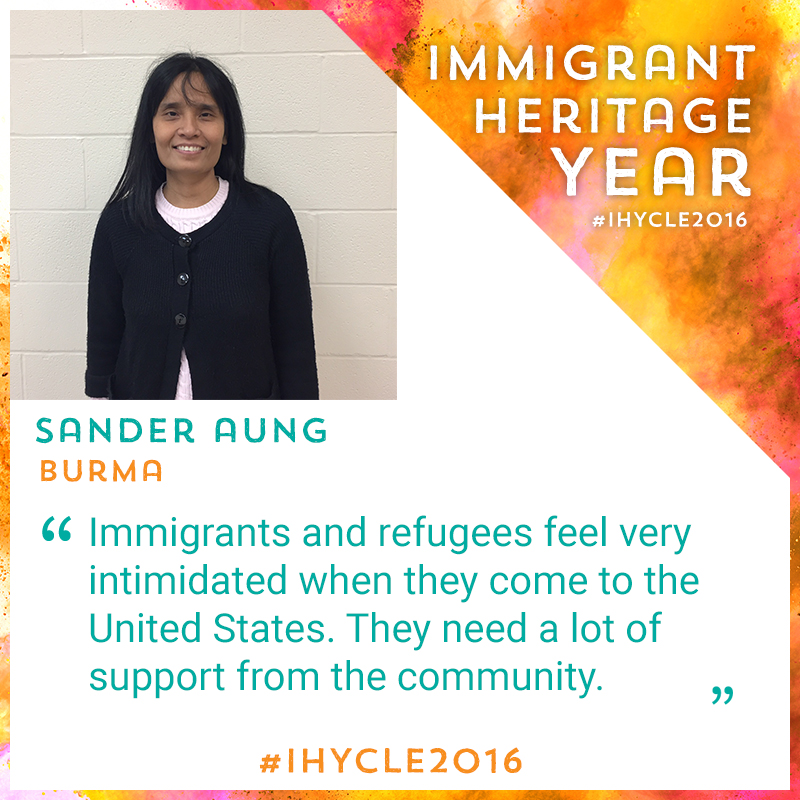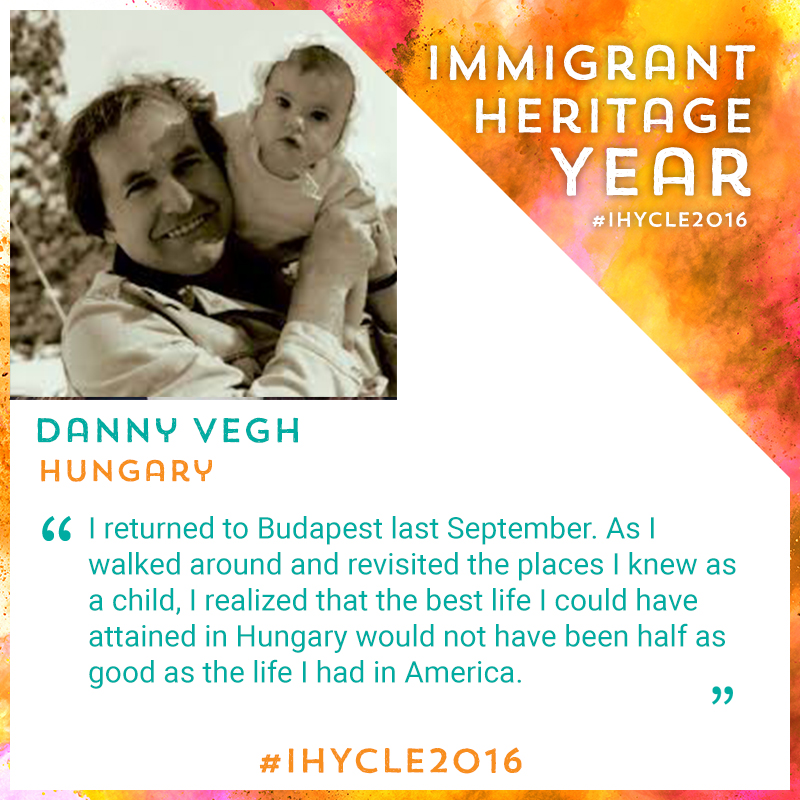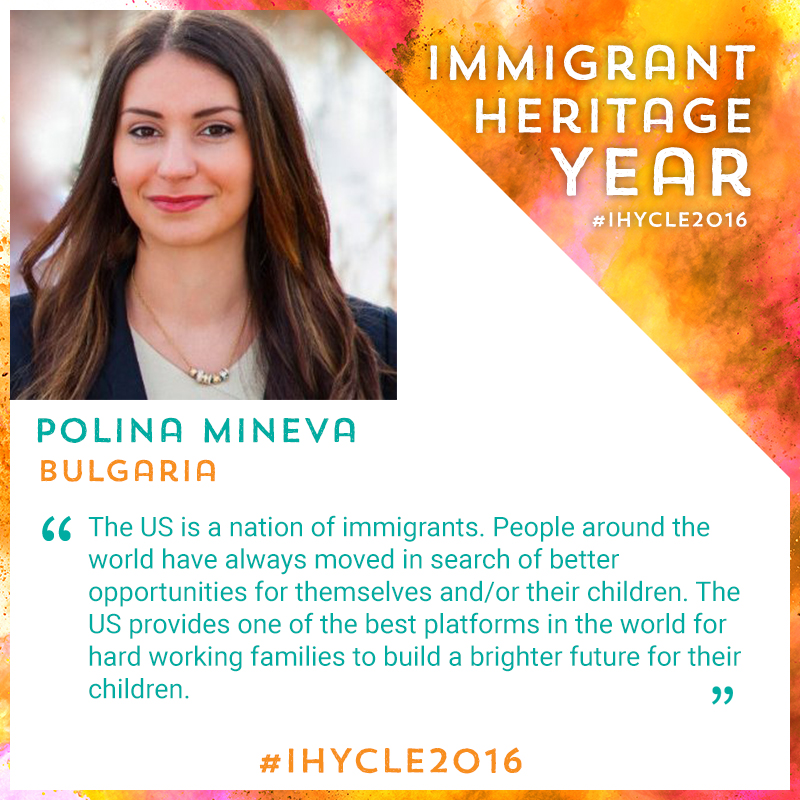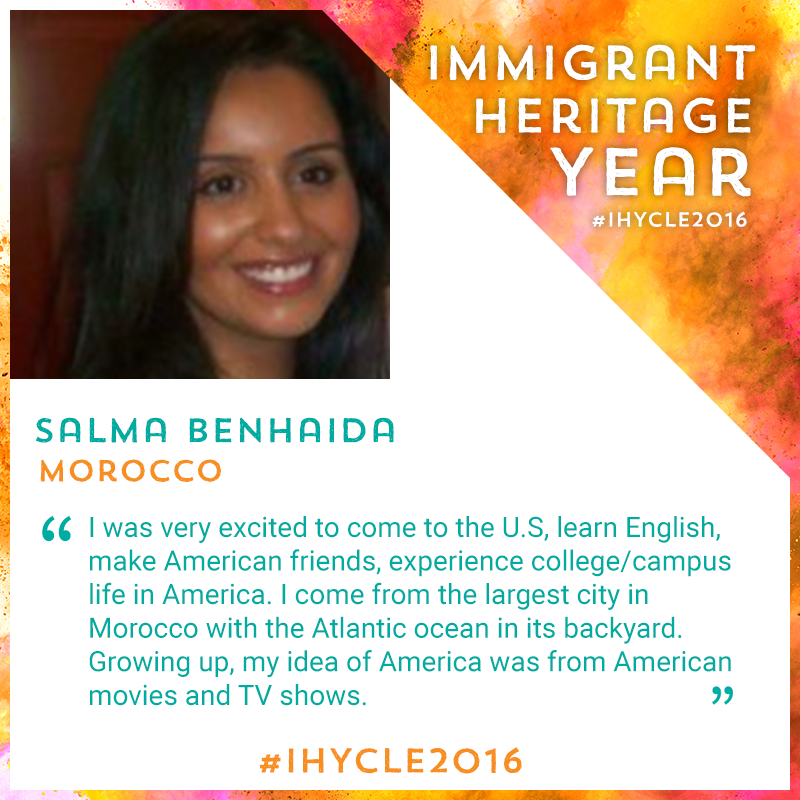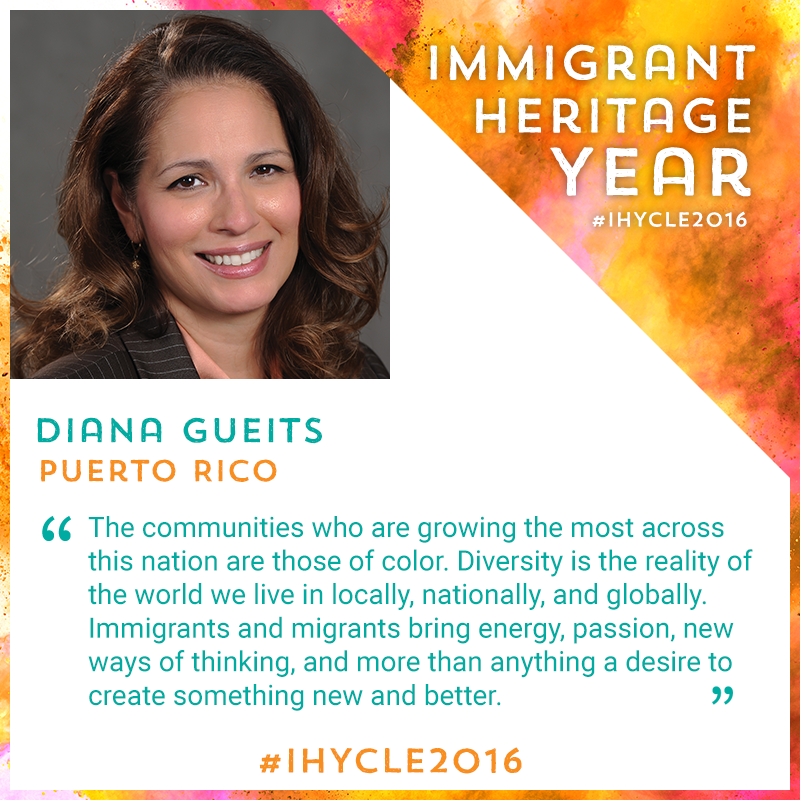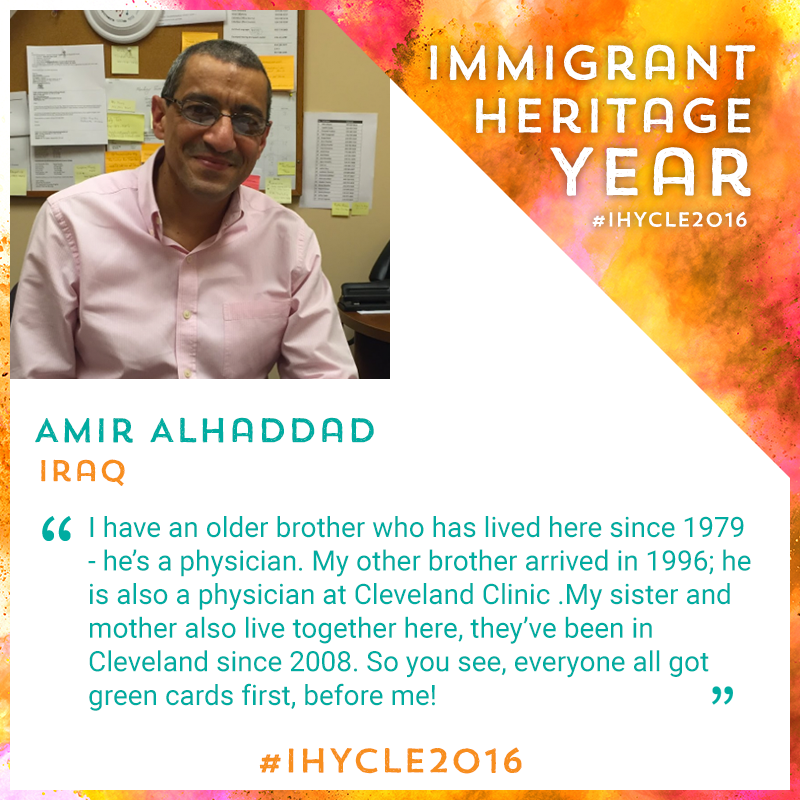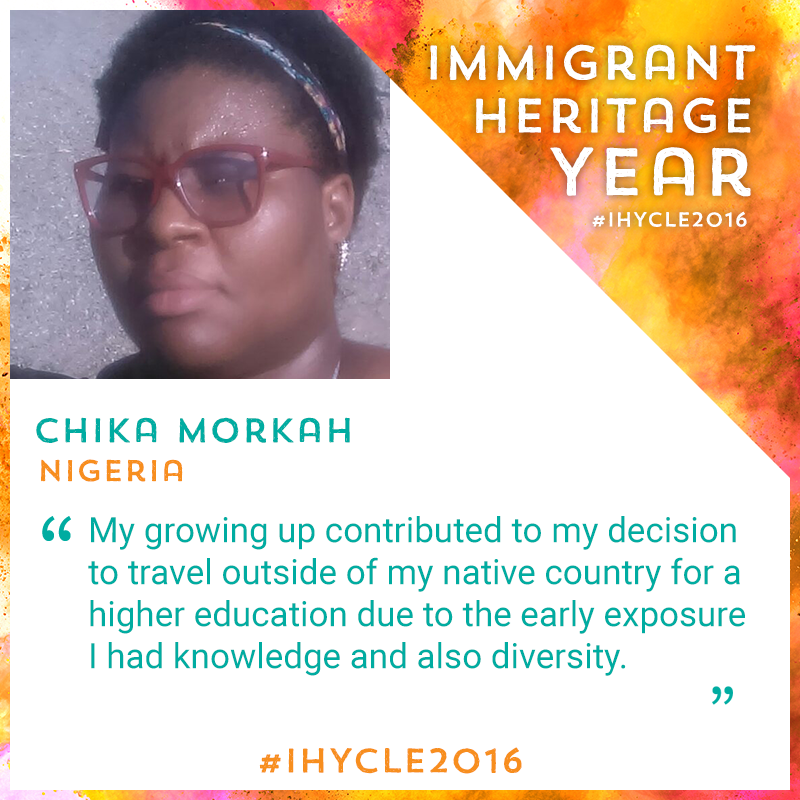Sander Aung
Occupation:
Instructional Aide
Where are you from?
Burma (Myanmar)
What was it like growing up?
I was growing up in Myanmar and graduated from University in Physics. Our country has been under military regime for over 50 years.
Why did you choose Cleveland?
I married to a man who works in Cleveland and went to college in Cleveland.
What were your first thoughts about coming to America? Did those change?
My first impression in America was very clean and helpful to the visitors.
What challenges did you face as an immigrant transitioning here?
Communication and culture shock.
What traditions or customs do you continue to practice?
I continue to practice my country traditions and customs.
How have Clevelanders made you feel welcomed?
Clevelanders always greet warmly whenever they see newcomers.
What do you love about Cleveland?
We love our sport teams, and Cleveland Clinic makes us healthy.
Why is it important to welcome immigrants and refugees?
Immigrants and refugees feel intimidated when they come to the United States. They need a lot of support from the community.
Why is it important to travel abroad?
Traveling abroad will expand your thoughts and ideas.
Danny Vegh
Julius Caesar famously said “When you’re in Rome, act like the Romans”. I love this quote, and I feel that when I am in America, I should act like an American. This mentality has provided me great success throughout the years and allowed me to attain the life I have today.
I was born in a suburb of Budapest, Hungary. My house had dirt floors and no running water. We got our first lightbulb when I was 16 years old. There was a church down the road from my house that had a ping pong table in its basement. I loved the sport, and it was the most popular sport in my country. It was popular in third world countries because the equipment was inexpensive. At 16 I became the boys champion. At 18 I became a junior champion. After that, I was a top-ranked player. I became nationally ranked in Hungary, which was home to the best ping pong players in the world.
I came to the United States in 1956. The first few years were difficult, and I had a hard time adjusting to Ohio. Even though Hungary is smaller and less populated than Ohio, Budapest was a far more cosmopolitan city. When I came to the United States, I worked in a factory. I started to play ping pong at a recreational center and people began to notice my skills. I began to play competitively to a wide degree of success. In 1957 I became the Ohio Table Tennis Champion. By 1958 and 1958 I was the national Champion of ping pong in Toronto, Canada. I won the Eastern Table Tennis Championship, and in 1960 I became the US Singles and Doubles US Champion of Table Tennis. I also became Canada’s Singles and Doubles Champion in Toronto as well. After my 1960 championship, I began to receive offers to partake in an exhibition.
Around this time, President Kennedy made physical fitness a priority for young Americans. I was approached by the University of Minnesota, who hired me to put on exposes in high schools and universities in 15 different states. I was thrilled by this opportunity, and my salary increased considerable! I did this for a couple of years. After this, the University of Kansas offered me a similar position, which I took as well. However, I was required to speak for eight minutes as part of the program. I didn’t speak any English at the time, and had no idea how I was going to fill this gap. William Tamko, a principal of and Eastside high school, approached me and offered to write a speech that I would memorize. I was able to recite the words, even if I didn’t know what they meant. For three years, I made speeches to thousands of people without any idea what I was saying. Over these three years, I appeared on national television 48 times, including The Tonight Show, The Michael Douglas Show, and Steve Allen’s Show.
In 1963 I became tired of traveling and staying in different hotels. I wanted to have my own business. I went to downtown Cleveland. As a former national champion of ping pong, I had a great opportunity to make a name for myself. I rented out my own space and hosted a large grand-opening event. I invited the 1936 Olympic fencing champion and my friend, the South American ping pong champion and put on an exhibition. The exhibition was promoted in the Plain Dealer and all three TV channels. The newspapers put my event on the front page of their papers. The event was a huge success! However, after this, the business was horrible. The only way I could keep the business open was to give ping pong lesson for $15 an hour at a time when the minimum wage was $1. I hardly made any money from the club because of the exorbitant rent I was paying for the property. Someone suggested that I add pool tables to my club. I followed this advice and found that pool was far more popular than ping pong. In 1963, when my lease was up, I opened a new billiards club that had a few ping pong tables in it. The club was very successful, and I had about 350 patrons visiting my shop a day.
At this location I hosted a tournament in 1971. I had to get creative about how I would get people in my doors. I hosted a tournament where people could play for free and the profits would go to charity. This tournament was advertised in the Plain Dealer for months before the event was to take place. People would come to my club and pay full price to practice for months before the tournament. The event was a huge success, and turned out to be the 4th largest billiards tournament ever.
Eventually, however, many billiards clubs began to close, including those that belonged to some of the best pool players. I was a good pool player, but not great. It would never be the career for me that ping pong had been. I realized that other players were neglecting their businesses to focus on their pool came. At that moment, I put down my pool cue and focused all of my attention to running my business.
I set up a small shop in pool room and started to sell pool tables and equipment. Unlike other companies, I set up my pool tables so that customers could play on them and get a feel for what they would be like in their homes. Pool tables were then taken directly from the warehouse to the customers’ homes. I sold hundreds of tables in this way.
I advertised my company in every way I could think of. I left business cards everywhere I went. I made pool cues with my name on them and sent them all over the world. I ordered match booklets that had my name on them, and they were distributed at drug stores all over the city. I didn’t make money off of these, but I could go all over the world and people would recognize my name.
Goodyear asked me to build a store in Akron. I opened a shop in Akron, but the building was costly to maintain, and management turned bad when I wasn’t around. When I would come to Akron to help get that shop into shape, the Cleveland store would start to struggle! Eventually, I had to make the decision to close the store in Akron in order to keep the up with the Cleveland location.
In 1979, the building where my store was located was closed and torn town. I moved my business to Lorain Avenue where I opened my first retail store. I was that location until 1992 when I moved up the street and opened a larger store at about 28,000 square feet. Business continued to be very good.
My daughter offered to work with me in 2002. Until then, she had been in law school, but decided to get her master’s degree in business once she joined my business. In 2003, we opened a new business in Akron, and in 30 days the business was in the black. Because the business was doing so well, we opened a fantastic location in Mayfield Heights in 2005. It was the most beautiful billiards location in the world. Both businesses are still there.
I returned to Budapest last September. Today, about 150,000 people live in the area in which I grew up. As I walked around and revisited the places I knew as a child, I realized that the best life I could have attained in Hungary would not have been half as good as the life I had in America. I am so blessed to have the life I have in this country.
Polina Mineva
Where are you from?
I am originally from Sofia, Bulgaria.
What was it like growing up?
I was very fortunate growing up. My brother and I would spend the school year in the capital and during the summer we would stay at my grandparents’ beach house on the Black Sea. Looking back now, I realize it was my parents who were the lucky ones to get a break from us.
I remember one year we went on a two-week bus trip with my classmates to Austria, Germany, France, and Italy. I must have been only about 10 years old at the time and I remember being allowed to go only because my older brother was going with his friends as well. My parents seemed to ignore the fact that at the time he didn’t like me much so he would have gladly given me away to a stranger if the opportunity presented itself. It is despairing that kids don’t have the same opportunities to travel as freely today because of the always looming threat of terrorism.
What brought you to Cleveland?
I moved to Cleveland from Washington, DC for work about two and a half years ago. My company’s global headquarters are in downtown Cleveland and I accepted the relocation package to further my career.
What were your first thoughts about coming to America? Did those change?
There were many things which I found strange when my family and I first moved to the US that I have now become accustomed to. Our school system in Bulgaria is very rigorous so when I started 7th grade in the US I was placed in an Algebra I class. By the time I was a sophomore in high school I was in AP Calculus. I thought that American kids weren’t as smart but now I know that it’s just a difference in the school curriculum. Americans tend to focus much more on creativity and athletic ability than on math and science which is just a cultural difference. Having just recently watched the 2016 summer Olympics it comes as no surprise that American athletes always dominated the competitions.
What challenges did you face as an immigrant transitioning here?
My family relocated to the Washington DC area when I was in middle school and since I was relatively young my transition was fairly smooth. Of course, there was a culture shock in the beginning and a language barrier but as a child it is easy to assimilate quickly. Fortunately, we moved to one of the most diverse areas in the country and I never felt much like an outsider.
What is your occupation?
I work in Global Mobility. I am currently a lead manager for our International Destination Services department.
How have other Clevelanders made you feel welcomed?
I have to say that growing up on the East Coast made my transition to the Midwest quite easy. I was amazed by how nice and friendly people are here. My coworkers had a big welcome party for me on my first day in the office and it wasn’t just my department, the whole company was there! They had these huge posters and everyone had written down their favorite things to do in Cleveland and their favorite places to eat. Almost three years later and there are still a few places left to cross of the list! I can honestly say that if it wasn’t for the people and the friends I have made here I would have moved back to DC a long time ago.
What traditions or customs do you continue to practice?
In Bulgaria we celebrate Name days. Every Bulgarian name, which is associated with an Eastern Orthodox saint, has a specific date on which it is celebrated. On August 15th it is Holy Virgin Mary’s Day so you call everyone you know by the name of Mary or Maria to wish them a happy name day. Although it was originally a religious practice it has turned into just another reason to get together and throw a party for your family and friends. My mother’s name is Maria which is one of the most popular names in Bulgaria. She has four name days during the year which is probably why she has insisted on keeping this tradition.
What do you love about Cleveland?
There are so many things I have learned to love about this city. I love the comradery, especially during sporting events. I love how affordable it is and that as a young professional I can afford to both work and live downtown. I love that I can walk to see a Broadway show in Playhouse Square or walk to one of the three stadiums downtown to watch a game! And last but not least I love how hospitable Clevelanders are.
Why is it so important to welcome immigrants and refugees?
The US is a nation of immigrants. People around the world have always moved in search of better opportunities for themselves and/or their children. The US provides one of the best platforms in the world for hard working families to build a brighter future for their children. It is upsetting that the word alone immigration has such negative connotation in so many people’s minds. There are so many great minds around the world, why shouldn’t they be allowed to contribute to our economy and society?
Why is it important to travel abroad?
Traveling abroad allows you to learn so much about another culture so quickly. It is one of the richest experiences you can have. Although on the surface it may look like you’re learning about another country’s history, art, architecture, culture, religion, traditions, etc., in reality you’re learning much more about yourself. Traveling abroad exposes you to new experiences and new people and the way you interact with those people allows you to peer into your own psyche and confront your own judgments. Ultimately, we realize that we’re not very different from one another after all.
Ben Promploy
Where are you from?
Thailand
Occupation:
Unemployed, but works at Tree Country Bistro family restaurant
What was it like growing up?
It was a lot of responsibility. I was there as a kid so I didn’t have to do much. I went to school but my parents had a lot of responsibility. In Thailand without education you can’t have a future, there’s nothing you can do but here that’s different.
Why did you choose Cleveland?
I came to Cleveland for more opportunities. My parents came here to open a restaurant and I came here to get a better education.
What were your first thoughts about coming to America? Did those change?
I always thought there was more opportunity and it is. There’s more freedom. It was exactly what I thought it would be, I knew exactly what it would be like.
What challenges did you face as an immigrant transitioning here?
Language was the biggest barrier for me and adjusting to the system. How school works here is completely different from here. Home you wore uniform, 8-3:30 which here that is like private school.
What traditions or customs do you continue to practice?
I still believe in my religion but I don’t practice holidays or anything specific. I follow my parents lead.
How have Clevelanders made you feel welcomed?
I came from Boston and I liked it, but Cleveland is nice. I went to Beachwood high school and they always welcomed foreign people, I was always treated nice.
What do you love about Cleveland?
I love the suburbs in Cleveland, I like the countryside.
What’s your favorite thing to do in Cleveland?
I like to see the museums.
Why is it important to welcome immigrants and refugees?
There’s more opportunity for them, everyone wants to seek more opportunity and be the best they can be. We should accept them and try to understand them.
Why is it important to travel abroad?
It’s important to learn about other countries and cultures.
Salma Benhaida
Where are you from?
Casablanca, Morocco
What was it like growing up?
I come from a tight knit family and I have fond memories of my childhood in Morocco. The ocean, the amazing food, the family gatherings, playing outside. I try and visit once a year as my parents still live there.
What brought you to Cleveland?
After completing High School in Morocco. I moved to Northeast Ohio to attend college. A U.S degree is highly valued overseas and I could not have done it without the moral and financial support of my parents.
What were your first thoughts about coming to America? Did those change?
I was very excited to come to the U.S, learn English, make American friends, experience college/campus life in America. I come from the largest city in Morocco with the Atlantic ocean in its backyard. Growing up, my idea of America was from American movies and TV shows. So you can imagine my disappointment when I first arrived to the Akron-Cleveland area and it didn’t look anything like New York City or Chicago. It took some time to get used to the smaller pace and the brutal winters but I love the area now and I am proud to call it home.
What challenges did you face as an immigrant transitioning here?
Being 18 years old in a foreign country away from my parents, friends and all that is familiar presented many challenges but it also gave me room to grow and mature as a person.
What is your occupation?
I work in International Education at Kent State University.
How have other Clevelanders made you feel welcomed?
Inviting me over for holidays, expressing interest in my culture and country, introducing me to Cleveland sports (tailgating was a foreign concept to me! I also didn’t understand the rules of American Football and Baseball)
What traditions or customs do you continue to practice?
Not very many, unfortunately. It is challenging celebrating Moroccan holidays here when they are not always observed in the U.S. I also do not know very many Moroccans in the area.
What do you love about Cleveland?
The people. The sports. The culinary scene. Fall foliage in the Metroparks.
Why is it so important to welcome immigrants and refugees?
Diversity and tolerance are an ethical and moral obligation . Welcoming people from around the world helps create mutual understanding and foster peace on a global scale.
Why is it important to travel abroad?
You learn a lot about other cultures through travel, but most importantly, you learn a lot about yourself. Travel changes you for the better and also challenges you to get out of your comfort zone. Your outlook on life changes and you learn to connect with others on a basic human level, transcending country of origin,
Diana Gueits
Where are you from?
My family is from Puerto Rico. Like many Puertoricans my family would migrate between Puerto Rico and the U.S. mainland. I was born in New York, however shortly after my birth my family relocated back to Puerto Rico. We came to the US when I entered elementary school.
What was it like growing up?
I have fond memories of growing up in Cleveland. Our family bought a house on E.32nd off Payne Ave. It was a very diverse neighborhood. I had Asian, Hispanic, African American, and Caucasian neighbors and schoolmates. Our families shared similar values and we in pursuit of better opportunities for themselves and their families. I attended Case elementary which offered dual education classes where newly arrived Hispanic students and the Asian students would switch classrooms and get to learn Mandarin and Spanish. I remember my teacher Mr. Lugo making home visits to help assimilate our parents to the US school system.
What brought you to Cleveland?
My mother remarried and decided to join her sister here. It was a very brave step. I don’t think that immigrants are recognized for the level of bravery it takes to leave everything you know and sometimes everything you own to begin a new life in an area that is completely unknown to you. I admire my mother’s bravery. She had less than basic English fluency and I know that it was difficult for her.
What were your first thoughts about coming to America? Did those change?
When we moved to Cleveland it was my first experience of not living in a Hispanic enclave. We spent some time in Chicago, however the Latino community here was not as established in other places. Although we lived in a diverse neighborhood here every time we stepped out of that neighborhood, I felt out of place.
There were places we knew were not welcoming. A great deal of other parts of the city where highly segregated. Cleveland has changed considerably and I love the energy that this city has and the strides that have been made to make Cleveland more inclusive. However there is still a great deal that needs to be done.
What challenges did you face as an immigrant transitioning here?
I was placed in Speech classes in elementary school here. Even though I spoke English well (at least I thought so). The speech classes was an instrument to reduce my accent. It still bothers me when I think of that, since I had no real speech impediment ever recognized by a physician.
Like many other immigrant children, I had to grow up very quickly and serve as the interpreter and navigator for my family from everything from getting bank accounts set up , scheduling and attending medical appointments to arranging services with the utility company.
It was like living in two worlds. The one where you have to be the family advocate and voice in the English speaking world and take on a very adult role and then having to transition to the role of a child within my culture. It was not easy for me, since the lines were often blurred.
What is your occupation?
I am one of the Directors in the Cleveland Clinic Office of Diversity and Inclusion.
How have other Clevelanders made you feel welcomed?
We were fortunate to have wonderful neighbors. Neighbors who had similar experiences and assisted in connecting us with an existing network of resources that made adapting to Cleveland much easier. These neighbors and friends became extended family members. There are people with great hearts in Cleveland.
What traditions or customs do you continue to practice?
The meals we prepare are still very traditional . Puertorican food and music are very central to our family. Respect to your elders is a stronghold in our community. I still ask for my parents blessing every time we speak or see each other. In many Latin American countries , whenever you enter a room or begin a conversation with an elder, you ask for bendicion (there blessing) as a sign of respect. I love that about our culture.
What do you love about Cleveland?
I love our Midwest values. It is a great city, full of rich history and amenities. It is a great place to raise a family. The number of organizations we have that are committed to improving the lives of our community are impressive. It is also a great place to make a name for yourself. I think we don’t capitalize on this enough when selling Cleveland , there are so many opportunities to get involved and really affect change. There is also a warmth and energy here that I have not experienced anywhere else.
Why is it so important to welcome immigrants and refugees?
The communities who are growing the most across this nation are those of color. Diversity is the reality of the world we live in locally, nationally, and globally. Immigrants and migrants bring energy, passion, new ways of thinking, and more than anything a desire to create something new and better. We need that and we will always need that if we are to be relevant.
What suggestions do you have to make Cleveland a more welcoming Community?
There are many I can think of. I think we need to have some intentional strategies on how we connect and support our existing communities of color. It is inauthentic to say that we “welcome you”, when we have existing communities that we have failed to be inclusive and connected with. We need to be an example of what the definition really means.
Menila Preevanich
Occupation:
Business co-owner Rho and Rice
Where are you from?
Thailand
What was it like growing up?
I grew up in Bangkok which is a big crown and very busy in Thailand
Why did you choose Cleveland?
I came here for to get my Master’s degree.
What were your first thoughts about coming to America? Did those change?
In the beginning I was thinking just have new experience and for school but everything change when I will have my own family here in the USA so I stayed to open the business.
What challenges did you face as an immigrant transitioning here?
The hardest thing is living on my own no family no one who I can talked with closely. So I have to learn how to take care of myself without someone around.
What traditions or customs do you continue to practice?
I continue doing thai traditional which is hardly to do like going to thai temple and pray.
How have Clevelanders made you feel welcomed?
Yes its very nice here including people they are very nice and welcome me and my family
What do you love about Cleveland?
It’s very nice place. I like the place that not too crowd and too quiet.
What’s your favorite thing to do in Cleveland?
I don’t have much time to do things but I can tell that since I’ve been here about 10 years CLEVELAND is my home now. I have friends, a husband and my 2 kids so I love everywhere in CLEVELAND.
Why is it important to travel abroad?
Yes I think it is important. You will learn lots of thing from everywhere over the world.
Amir Alhaddad
Where are you from?
Iraq.
Occupation:
Interpreting services coordinator
What was it like growing up?
I was born in Iraq, and I studied at a college of science and engineering. I started an electrical contracting company with a partner (we worked with diesel generators, which were in high demand because of the constant lack of power; as well as with electronic spare parts). So we ran it as a shop and a company.
I did this until 2006, which was the peak of sectarian war in Iraq. So my partner and I left Baghdad for Northern Iraq, which was safer. My partner had a lot of family there that we could stay with. After that, my family and I moved to Abu Dhabi in the United Arab Emirates, where I got a job with a consultant company after two months. In 2012, my application for a visa was approved, and I was told I had to leave in 20 days. This was a very strict deadline for me; it was very stressful because of all the paperwork needed. I also was scared telling my boss, because in UAE you have to give 30 days’ notice to receive the termination benefits. However my boss was very understanding and told me he would work it out. And then, I left Dubai and arrived in Cleveland September 14th, four years ago!
After one year here, I could apply for a green card, but it was not possible to work. The term “legal refugee” scares employers because they don’t know what it means - you’re a refugee?! I got a green card finally in 2014, so I could start looking for a job. At the end of that year, I heard about a job with a program connected to the Cleveland Clinic who needed interpreters because a lot of their clients were from the Middle East.
Then, one year later, I got this job. I had actually arrived in US through USTogether, so I had been keeping contact with them. With my job at the Clinic, I went through training as an Interpreter, which qualified me for this job. Also, my wife works at US Together too, she had started as a contractor several months earlier.
What brought you to Cleveland?
I have an older brother who has lived here since 1979 - he’s a physician. My other brother arrived in 1996; he is also a physician at Cleveland Clinic .My sister and mother also live together here, they’ve been in Cleveland since 2008. So you see, everyone all got green cards first, before me! Also, my wife’s parents are living in columbus. Living in UAE was good, but unstable. You can get kicked out any time for not being a citizen. So I was always very nervous and wanted to leave.
What were your first thoughts about coming to the U.S.? Did those change?
Back in the Middle East, everything is close together. You walk out of your home and the grocery store is right there on the street.
When I arrived in the USA, I was surprised because the houses are so far away from each other and the streets were empty. Where is grocery store?! Also, the difficulty of finding a job. I had expected it to be hard, but not this hard. So I found the place very nice, but it was much harder job-wise.
What challenges did you face as an immigrant transitioning here?
I did not really have any, besides the job search and waiting for a green card. Maybe I am just a special case, because I had my own company in Iraq. So money was not a huge concern, and the termination benefits helped too. On top of that, I was lucky to have my brothers’ support too.
How have other Clevelanders made you feel welcomed?
My daughter is in 7th grade now, and people are so friendly and helpful. When I first came to America in September, school had already started and I wanted to enroll my daughter. I met with the principal of the school close to my mother’s house and explained my family’s situation. You know what the principal said? “Wow, you and your daughter came from Iraq yesterday? You must have jetlag, go home and sleep!” So he was very understanding. And my daughter loves it there now. Also, it was great that I didn’t have to look for a new home, so that wasn’t as stressful.
What traditions or customs do you continue to practice?
I have so much family here, so we still practice all traditions from home in Iraq. And I am Muslim, so even the Muslim holidays. Like I still fast during Ramadan, even during work. Actually all of the people in the office prepare a huge feast for Eid! But it’s still different than how it was back home. In Iraq, work is off for eid so everyone can gather together and visit family together.
What do you love about Cleveland?
The nature. This is one of the few places I’ve seen in America - I have visited only a few other states for job fairs - but I love that I can see the four seasons. Everything is fresh! In Dubai, we called it a “hot hell.” It’s too hot to live there. Everything is temporary.
Why is it so important to welcome immigrants and refugees?
Well, why are they refugees? They already suffered a lot in their home country, but they are still human so they deserve a simple welcome at least. And suffering is different among places - for me, leaving was putting my bags onto a plane, but some of my other family and friends had to literally run to escape violence and war. One of my friends is in Turkey right now and he tells me about the horrible things ISIS did.
Why is it important to travel abroad?
My daughter does many activities, so I drive her around, and I talk to the people there. And it’s so surprising. They don’t really know what’s going on in the world. I told someone I was from Iraq, and she said, “where’s Iraq?” I was shocked! You have so many of your people fighting there! When I was young, my friends and I knew everything that was going on in the world. We didn’t have internet because it was banned, but we listened to the radio and read the news. I am so surprised that most of the people I talk to do not know much about the world.
Chika Morkah
What is your name?
My name is Chika Morkah
Did you grow up outside of the US? If So, what was it like growing up in your native country?
Yes, I did grow up outside of the US. I was born in Nigeria, from the eastern part of Nigeria. I grew up amongst boys so I didn't do what girls would normally do growing up. Playing soccer, playing pranks on people and doing all kinds of sports. I am the last born in my family so I grew up around so many older people so I learnt a lot about life and saw some of it unfold.
How did you decide to attend a university outside of your native country?
My growing up contributed to my decision to travel outside of my native country for a higher education due to the early exposure I had knowledge and also diversity. My mom always taught us to love no matter the colour of the skin. She had a strong attachment to that belief because she grew up with british people who in the 1950s and 60s could have chosen to be slave drivers but were very kind to them despite the colour of their skin. She imparted that unto us her children so it stuck real strong. The school curriculum and the program was another thing that drew my attention the the outside world.
What were your first thoughts about coming to the United States? Did those change?
My first thoughts about coming to the US was a limited notion that people highly minded their business and you can easily cater to yourself. You have to ask for help when needed. The notions changed largely due to my personal experiences on arrival. I saw that most of my information was not accurate. It has been a good experience so far.
Did you face any challenges transitioning to the US or to Cleveland?
I came straight from Nigeria to Cleveland without having to live in any other city in the US yet, from my journey to settling down into the Cleveland Hostel, it was a very smooth transition. Moving on to the culture....there was no shock at all...I already knew that there is a reliable bus system even if i don't have a car and all i had to do was pay to get by, i already knew that i was coming into an entirely different system and structure of government so i had to make the adjustments in y mind before coming. So it was generally a smooth transition.
What Traditions or customs do you continue to practice?
The tradition of Humanity. Constantly reminding myself that we are all the same no matter the difference in culture and race, we are humans first before anything. In addition to loving people, sometimes it can be really difficult but with the grace of God and strength of character we can do it.
Why is it so important to welcome immigrants and refugees?
It helps create balance in lifestyle. It also creates options for people to adapt and interact with new cultures and traditions. We don't have to accept them but accommodating them is a good way to grow and expand in knowledge. Nobody knows everything. We learn everyday.
Why is important to travel abroad?
Diversity. Exposure to all kinds and types of character, personality, lifestyle and cultures that exist are limitless. Nobody can really know everything, travelling is a good way to find the balance that we need in life because if we try to put ourselves in people's' shoes' we might be able to understand better how they think, not to use it against them but to help nurture.
Onur Topuzlu
Where are you from?
Izmir, Turkey
What was it like growing up?
We moved a lot due to my father’s work. It was a great experience living in multiple cities in Turkey and Germany when I was a kid. I’ve had wonderful time with my family and relatives growing up. Family relationships were always the most important things in our lives.
What brought you to Cleveland?
Kent State University, I came for my Master’s degree at 2007 and stayed afterwards. I really liked the area and opportunities.
What were your first thoughts about coming to America? Did those change?
I thought it was little different from what I imagined. People were a lot nicer than what I guessed. Although a lot of things in daily life gave me some hard time in the beginning(such as food, paperwork stuff, human relationships), I really loved being in the US. Luckily, I had a lot of Turks around me who helped a lot.
What challenges did you face as an immigrant transitioning here?
Missing family and home. This was my first time away from my family. Some of the bureaucracy, I had to learn myself without being introduced by anyone. One big challenge was being without a car for a month in Winter when I first came. Lack of public transportation(at least very limited) was a shocking fact I found out in the area.
What is your occupation?
Simulation and Desktop Support Analyst at Kent State University College of Nursing. My work is about various simulation technologies and technology infrastructure. I am also working on my PhD in Instructional Technology.
How have other Clevelanders made you feel welcomed?
Excellent, I feel like home here. I can easily say people around here are some of the greatest in the whole world. Clevelanders and Ohioans have a remarkable spirit and pride which is similar to my culture in many ways..
What traditions or customs do you continue to practice?
Meeting Turkish friends for picnics and events
Watching soccer games(Turkish League)
Hosting guests at home with Turkish hospitality
Turkish food in restaurants in the area and home.
Are some of the things I really enjoy.
What do you love about Cleveland?
Great for families and attractions. Cleveland and surrounding areas have excellent schools, hospitals and recreational areas.
Excellent location for getaways to nearby places and shopping. Wonderful people in CLE and NE Ohio. Also pretty multicultural area.
Why is it so important to welcome immigrants and refugees?
Diversity provides great opportunities in building relationships with other cultures. Lots of people in the world are not fortunate as us. Helping others contribute to the reputation of your community and nation in international platform.
Welcoming people with hardship is a valuable opportunity for Cleveland and the United States. I think we can feel a little bit happier when we see people get at least some relief in these hard times, which would make a great example.
Why is it important to travel abroad?
Learning about other cultures and seeing the other parts of the world is pretty exciting.

